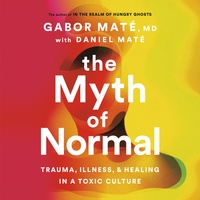Take a photo of a barcode or cover
The "Myth of Normal" is a book written by Dr. Gabor Maté. The book presents a research on how trauma and stress have long term effects on both mental and physical health. The appearance of autoimmune illnesses, cancer, and ADHD have perceptibly risen affecting a significant portion of the population and medical scientists have been unable to discover the cause
The stress and toxicity of modern times have affected negatively the quality of life of a significant portion of the population. Dr. Gabor Maté interviews people who have been affected by terribly ailments and still have managed to recuperate themselves to the surprise of their physicians.
It has plenty of information that became tiring at times but the research was fascinating. "Alternative" ways of healing has been considered a pseudoscience for a very long time but it has started to become accepted by more open-minded doctors. I need to re-read the book to get a further understanding on the research but left me wondering if healing our souls is the remedy for most of the modern problems of our lives.
The stress and toxicity of modern times have affected negatively the quality of life of a significant portion of the population. Dr. Gabor Maté interviews people who have been affected by terribly ailments and still have managed to recuperate themselves to the surprise of their physicians.
It has plenty of information that became tiring at times but the research was fascinating. "Alternative" ways of healing has been considered a pseudoscience for a very long time but it has started to become accepted by more open-minded doctors. I need to re-read the book to get a further understanding on the research but left me wondering if healing our souls is the remedy for most of the modern problems of our lives.
jumbled and all over the place- the autoimmune disease talk had me pissed and I didn’t finish
challenging
emotional
hopeful
informative
reflective
tense
medium-paced
it validated my understanding of life in a way nothing ever has. it spoke to the truth and the inner knowing I have within and allowed more of my true essence to awaken. thank you.
More a 4.5 than a 4. Another book that I feel should be required reading for many, many folks. It starts off as a deep dive into different illnesses and conditions that are on the rise and the emerging science linking them to early trauma, then gets into an exposition of what Maté sees as the sources of trauma (and he makes a watertight case, in my view) including capitalism, patriarchy, the state of current politics, and pop culture. The last section explores pathways to healing, at the individual and more societal level. Actually I should give this book five points, with the extra half point for a thoughtful, evidence-based, and non-parochial discussion of psychedelics and their role in healing.
This book cohesively frames the work that I do without mentioning the work that I do... (coach people around trauma from domestic violence, coercive control, and family court). I am glad it touched on structural violence (how it is systems that are oppressing people) and it aims to normalize trauma. If you are not experiencing trauma, you are an outlier, an anomaly.
An important read if trying to understand how adoption is trauma.
There were good reflective exercises in the last few chapters, aimed at reframing self limiting beliefs, getting perspective, and increasing self agency (all things coaching can help people do!)
My hiking metaphor for this book:
We grow up hiking a well worn path, whether it was good or not, and we potentially had horrible trail guides. It is what we know, and it does not always take us to where we want to go and might not be enjoyable. At some point, after getting hurt on the trail or seeing a glimpse into other places, we realize we don't have to stay there, in a place that is no longer serving us. We can forge our own path, learn new things.. We might be reminded of that first trail, but can shift focus to something more enjoyable. Pick a trail that we actually want to be on, that will get us to places we actually want to go to and the people we want to be with. (the old trail is the neural pathways in the brain we grew up with, the new trail are the new pathways we can build by retraining the brain)
An important read if trying to understand how adoption is trauma.
There were good reflective exercises in the last few chapters, aimed at reframing self limiting beliefs, getting perspective, and increasing self agency (all things coaching can help people do!)
My hiking metaphor for this book:
We grow up hiking a well worn path, whether it was good or not, and we potentially had horrible trail guides. It is what we know, and it does not always take us to where we want to go and might not be enjoyable. At some point, after getting hurt on the trail or seeing a glimpse into other places, we realize we don't have to stay there, in a place that is no longer serving us. We can forge our own path, learn new things.. We might be reminded of that first trail, but can shift focus to something more enjoyable. Pick a trail that we actually want to be on, that will get us to places we actually want to go to and the people we want to be with. (the old trail is the neural pathways in the brain we grew up with, the new trail are the new pathways we can build by retraining the brain)
Long winded. Repetitive. Did not leave space for other opinions?
3.5. There were parts of this book that resonated so much with me and parts that made me want to whip out my phone and email the author about how wrong he was. The book is long and sprawling but it's mostly about how our early wounds and traumas (and sometimes generational wounds and traumas) are scientifically linked to many if not all of the illnesses that befall us later in life. It's fascinating stuff but it also frustrated me beyond belief. Gabor talks about the conditions that humans thrive in and how important community and support are to provide us all the best chance at a physically and emotionally healthy life. It's no surprise that those conditions are nowhere to be seen in our modern, capitalist culture. Hearing about what would make things better and feeling like all of those things are wild pipe dreams was discouraging to me. The part of this book that enraged me most was his stance on breastfeeding. He came hard for Emily Oster, making her sound like an uninformed anti-mom who didn't want to breastfeed because it was boring. He talks about how incredibly vital breastfeeding is for bonding. He says that breastfeeding has many health benefits (he cites zero evidence here) and says women are being discouraged from breastfeeding but ANY mom will tell you the pressure to breastfeed is ALIVE AND WELL. Feeding your baby is bonding. Not breastfeeding doesn't mean not feeding. Any way you feed your baby involves bodily closeness and attention. Shame on him for trying to make it sound like if you don't breastfeed, you're setting your child up for health issues. The absolute, hands-down, best thing about this audiobook was the reading by Daniel Mate, the author's son and co-author. His reading was probably the best audiobook reading I have ever heard in my life.
informative
reflective
medium-paced




